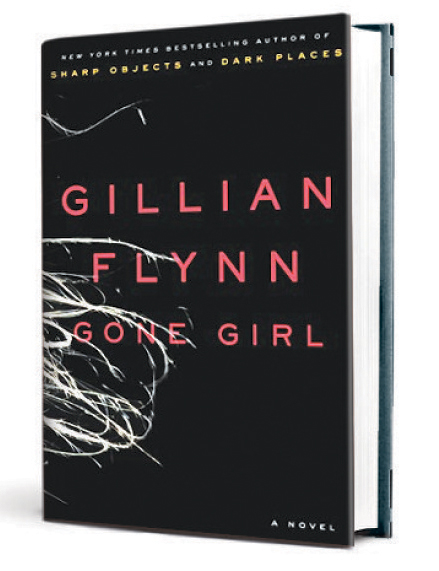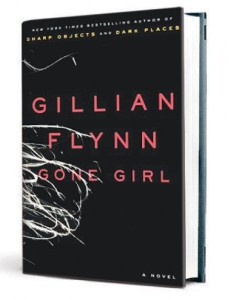Books, like all other products we consume, are subject to trends. What was popular mere months ago might suddenly feel stale, and overnight sensations are always apt to arise out of nothing, sweeping everything off your to-do list. Whether Fifty Shades of Grey requested your immediate reading attention is up to you, but it is undeniable that the fanfic-turned-erotic zeitgeist got people talking. For a while, you couldn’t take the subway without seeing a cover bearing Lisbeth Salander’s pseudonym, and The Hunger Games doubtlessly experienced its own fireburst of fame. But lately I’ve noticed a new book trending on public transportation: Gone Girl: A Novel by Gillian Flynn.
I’m a pretty voracious follower of pop culture, but even I was surprise by the speed at which I devoured Gone Girl. From the first page, I was hooked—despite the fact that the initial description of the novel didn’t exactly draw me in. It was about married people in Mississippi. One disappears, leaving the other reeling in confusion and loss. As someone who tends towards fantasy novels and lush magical realism, Gone Girl sounded stark and maybe a little bit depressing, full of crooked cops and drunk locals. In actuality, the novel was both stark and depressing (and had it’s fair share of idiot policemen and the usual suspects)—but it was also fascinatingly twisted and completely unpredictable. It was like ordering a PBR and getting a Jägerbomb, poured deceivingly into the lusterless tin can.
Gone Girl starts by introducing us to Nick, and through him, to his absent wife, Amy. It is their fifth wedding anniversary, and beautiful, flighty, smart Amy has been spirited away. The living room is in shambles and there’s blood on the floor. This alone would make most people suspect the worst, but Nick stays relatively calm. He even smiles when greeting the press. Not quite a monster, there is something clearly off-kilter about the handsome narrator. He tells us, his voiceless readers, that he most certainly didn’t murder his wife. But it’s hard to fully believe him. As a storyteller, Nick is extremely unreliable. He is also revealed to be rather forgetful, selfish, and maybe a little unkind. He may be movie star handsome, but one does not fall in love with Nick. Unless, of course, you are Amy.
But who is Amy? Fortunately, we get to find out, as Flynn chooses to insert chapters from Amy’s diary—which begins years ago, right before she first met Nick—into the narrative. Through this, we are shown the barest outline of a person. Amy loves Nick, Amy is a people-pleaser, Amy is anxious, Amy is kind, but a little pathetic… but is this really Amy? It’s a question you have to ask over and over. Who are these two lovebirds? And how did something that started so sweetly end up with blood and fingerprints?
As you read, Flynn slowly draws away the curtain, letting you see pieces of the couple. Like watching friends squabble at dinner, the reader feels like they have been let into something private, something a little bit sordid. But unlike that banal scenario, Flynn’s dysfunctional couple won’t resolve things by the time dessert is served. Even at the end of the novel, when everything has finally been made clear, there is no happy resolution. Justice has not be served—though one could potentially argue that everyone got what they deserved. Whether those two ideas can be reconciled is a sticky subject, one I don’t think I’m quite qualified to address.
In many ways, that is exactly what makes Gone Girl such a great noir novel. It’s unapologetically and consistently dark, though there are moments of humor to lighten the experience. While there are no truly likable characters, there are moments when I found myself cheering for Nick, and then Amy, and then Nick again. One particularly great passage described Amy’s disdain for “cool girls,” girls who shape themselves around masculine expectations. Girls who pretend to enjoy sports and beer to be liked. Girls who say everything is fine, because having emotions is not “cool.” Though she knows how to play the part, Amy hates these girls (and I must admit, so do I).
But even with this feminist treatise hidden within, Gone Girl has no particular affiliations. It’s not really a feminist novel, nor is it a political one. It’s just a damn good book about murder, marriage, and mystery. If anything, it can be read as a metaphor for the demise of every relationship; there’s always two sides to every story and most long term couplings are broken by a myriad of small things, not one big, earth shattering event. There are some minor flaws in the writing, but this is a book you read for pleasure, not the beauty of the words. Gone Girl is a highly creative page-turner that might just make you a fan of noir; already, I consider it my gateway drug into the seedy underworld of the genre. If you prefer your stories light and silly, proceed with caution.












